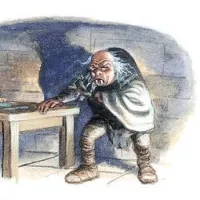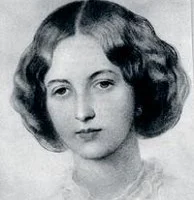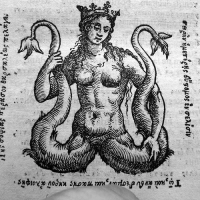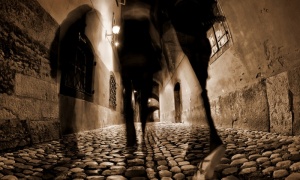A writer whose life was as fascinating as her output, Marjorie Bowen was born Margaret Gabrielle Vere Campbell Long in 1885 on Hayling Island, Hampshire. Her mother had literary aspirations; her father was an alcoholic who died on the London streets. She spent the early years of her career writing prolifically to support her extravagant mother and sister. She used a variety of pen names to conceal her huge output of over 150 novels, using the Bowen pseudonym on her supernatural stories, starting with Black Magic (1909), a tale of a medieval witch that became a best seller. Despite this productivity, the best of her books brilliantly conjure up haunted landscapes along with a unique mixture of cruelty and pathos among her characters. The best of the Bowen short stories – or ‘twilight tales,’ as she liked to call them – were collected in several volumes between 1917 and 1932, her own favourites appearing in The Bishop of Hell (1949).
The family was poor and moved constantly to avoid clearing debts. Bowen had no formal education, but used libraries and museums to provide herself with the tools she needed for a writing career. Her first novel, The Viper of Milan, set in 14th-century Italy, was published to acclaim when she was just 21, but had first been rejected by 11 publishers who felt it was not the sort of thing a young Edwardian woman should write. Bowen received £60 for her work, which she surrendered to the family, but her mother was jealous of her success and became increasingly embittered. Bowen’s money was banked in her ungrateful mother’s name, and was spent as fast as she earned it. With each hard-earned advance being frittered away on trivial luxuries and loans to her mother’s hangers-on, Bowen seemed always panicked into writing for money, and never stopped being the family breadwinner. The discord affected her so badly that she wrote a brutally honest account of her life in The Debate Continues.
She entered her first loveless marriage with a demanding, sickly Sicilian in order to escape the cruelties of home, and only found happiness through her children. Despite the apparent wretchedness of her life, she wrote more than 150 volumes under half a dozen pseudonyms, and tackled larger-than-life subjects in historical dramas, supernatural tales and mournful gothic romances. Critics have long considered her storytelling to be clear-eyed and efficient, her detail and description masterful, her understanding of human nature filled with compassion and sorrow. Bowen’s books are much sought after by aficionados of gothic horror and received praise from, among others, Graham Greene, who stated in his Paris Review interview (Autumn 1953), “…books such as Marjorie Bowen’s, read at a young age, do influence one considerably.” Bowen illuminated a wide variety of passionate subjects by tackling them in novel form, and was widely admired by other authors, including Fritz Leiber, a staunch admirer of Black Magic. Would she be better remembered now if she had written at leisure, purely to indulge her obvious love of prose, instead of doing it to clear her mother’s bills? We may never know the answer to this, but we are lucky that Bowen left such an eminent body of prose behind for the pleasure of generations of readers since their initial publication.

















Leave a comment